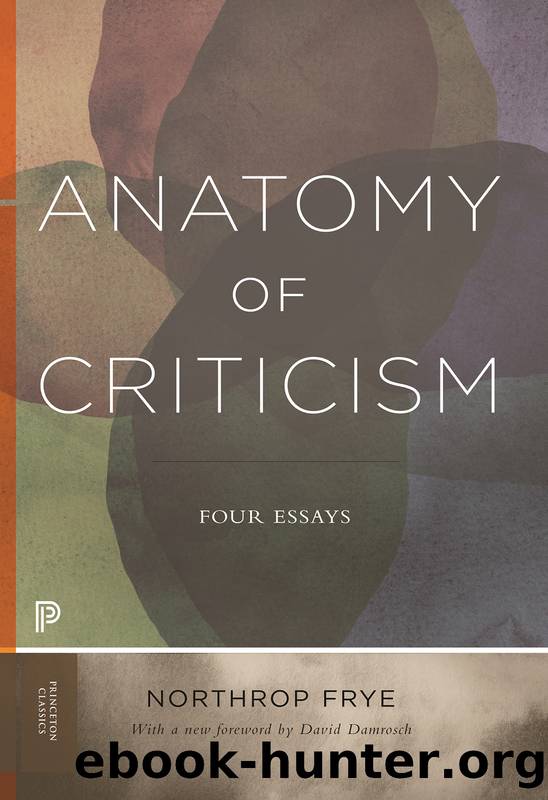Anatomy of Criticism by Northrop Frye

Author:Northrop Frye
Language: eng
Format: epub
Publisher: Princeton University Press
Published: 2020-03-12T00:00:00+00:00
THE MYTHOS OF AUTUMN: TRAGEDY
Thanks as usual to Aristotle, the theory of tragedy is in considerably better shape than the other three mythoi, and we can deal with it more briefly, as the ground is more familiar. Without tragedy, all literary fictions might be plausibly explained as expressions of emotional attachments, whether of wish-fulfilment or of repugnance: the tragic fiction guarantees, so to speak, a disinterested quality in literary experience. It is largely through the tragedies of Greek culture that the sense of the authentic natural basis of human character comes into literature. In romance the characters are still largely dream-characters; in satire they tend to be caricatures; in comedy their actions are twisted to fit the demands of a happy ending. In full tragedy the main characters are emancipated from dream, an emancipation which is at the same time a restriction, because the order of nature is present. However thickly strewn a tragedy may be with ghosts, portents, witches, or oracles, we know that the tragic hero cannot simply rub a lamp and summon a genie to get him out of his trouble.
Like comedy, tragedy is best and most easily studied in drama, but it is not confined to drama, nor to actions that end in disaster. Plays that are usually called or classified with tragedies end in serenity, like Cymbeline, or even joy, like Alcestis or Racine’s Esther, or in an ambiguous mood that is hard to define, like Philoctetes. On the other hand, while a predominantly sombre mood forms part of the unity of the tragic structure, concentrating on mood does not intensify the tragic effect: if it did, Titus Andronicus might well be the most powerful of Shakespeare’s tragedies. The source of tragic effect must be sought, as Aristotle pointed out, in the tragic mythos or plot-structure.
It is a commonplace of criticism that comedy tends to deal with characters in a social group, whereas tragedy is more concentrated on a single individual. We have given reasons in the first essay for thinking that the typical tragic hero is somewhere between the divine and the “all too human.” This must be true even of dying gods: Prometheus, being a god, cannot die, but he suffers for his sympathy with the “dying ones” (brotoi) or “mortal” men, and even suffering has something subdivine about it. The tragic hero is very great as compared with us, but there is something else, something on the side of him opposite the audience, compared to which he is small. This something else may be called God, gods, fate, accident, fortune, necessity, circumstance, or any combination of these, but whatever it is the tragic hero is our mediator with it.
The tragic hero is typically on top of the wheel of fortune, halfway between human society on the ground and the something greater in the sky. Prometheus, Adam, and Christ hang between heaven and earth, between a world of paradisal freedom and a world of bondage. Tragic heroes are so much the highest points
Download
This site does not store any files on its server. We only index and link to content provided by other sites. Please contact the content providers to delete copyright contents if any and email us, we'll remove relevant links or contents immediately.
The Power of Myth by Joseph Campbell & Bill Moyers(1065)
Half Moon Bay by Jonathan Kellerman & Jesse Kellerman(986)
A Social History of the Media by Peter Burke & Peter Burke(985)
Inseparable by Emma Donoghue(982)
The Nets of Modernism: Henry James, Virginia Woolf, James Joyce, and Sigmund Freud by Maud Ellmann(911)
The Spike by Mark Humphries;(811)
The Complete Correspondence 1928-1940 by Theodor W. Adorno & Walter Benjamin(787)
A Theory of Narrative Drawing by Simon Grennan(778)
Culture by Terry Eagleton(774)
Ideology by Eagleton Terry;(741)
World Philology by(718)
Farnsworth's Classical English Rhetoric by Ward Farnsworth(714)
Game of Thrones and Philosophy by William Irwin(712)
Bodies from the Library 3 by Tony Medawar(708)
High Albania by M. Edith Durham(703)
Adam Smith by Jonathan Conlin(693)
A Reader’s Companion to J. D. Salinger’s The Catcher in the Rye by Peter Beidler(688)
Comic Genius: Portraits of Funny People by(651)
Monkey King by Wu Cheng'en(651)
